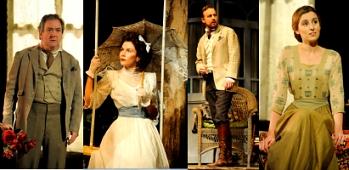Uncle Vanya Review from 2012
If you have a 'take it or leave it' attitude to Chekhov's plays you may want to reconsider because this version of 'Uncle Vanya' has some exceptionally fine performances to relish.
On a country estate somewhere in Russia, life is repetitive and boring. Nothing much happens. And, in fact, not a great deal happens during the course of the play either. So much so that when Tolstoy first saw it, he famously said "Where's the drama?". But there's actually quite a lot, even if nothing changes as a result of it.
Vanya manages the estate on behalf of Serebryakov, a professor who previously lived in the city but has been recently residing at the estate along with his younger second wife, Yelena. The usual household rhythms have been disturbed, and Vanya has fallen in love with Yelena. But he has a competitor in this regard in the form of Astrov who is a local doctor and regular visitor at the estate. Astrov is obsessed with the deforestation of the surrounding countryside and the associated disappearance of the fauna. To complicate matters, Vanya's niece, Sonya, is in love with the Doctor and Serebryakov has plans to sell the estate which, when they are revealed, throw the household into confusion, and the simmering frustration which has been gnawing away inside Vanya, quite literally explodes.
Between acts, there are some fairly lengthy scene changes. These are quite intrusive, and I could not help wondering whether they were worth the effort. A minor irritation, possibly, because there are advantages to having some short breaks during quite an intense play. Otherwise, Christopher Oram's design is rather striking as it looks like a forest or two of wood has been used to create it - something Doctor Astrov would no do doubt complain fiercely about. And, actually, that may be exactly the point.
The opening night was spoilt by someone talking very loudly at the front of the stalls during the performance. For about the last ten minutes or so, I could hardly hear what the actors were saying on stage, and the distractions were augmented by the inevitable prompts from members of the audience for the person speaking to shut up. However, the actors bravely soldiered on and I suppose we were lucky that the mysterious speaker*** did not start his ramblings much earlier.
That aside, the performances on display here are quite exceptional and work wonderfully together. Ken Stott is superb as Uncle Vanya. At the beginning of the play when he wakes from his nap and starts ranting about the professor's writing one instantly recognises a man who is close to breaking point. Mr Stott's Vanya is literally seething with resentment and anger which has obviously been building up for years. However, Mr Stott also shows us the comic side of this character too. So, when the professor announces his plans for the estate and Vanya loses the last vestiges of control, we hardly know whether to weep or fall about in the aisles. Paul Freeman is also in excellent form as Serebryakov, producing an agitated but humorous rant about his age which almost rivals Vanya's about him. There is terrific support from Samuel West as Doctor Astrov, obsessed by deforestation; Anna Friel as the beautiful Yelena who is bored to death by rural living and disgusted by her admirers. And June Watson is perfectly cast as nanny Marina. She looks like one those Russian dolls with layers of skirts too numerous to count, and broods over the samovar as if it is some kind of nuclear installation. But Ms Watson has a wonderfully warm, comforting voice that one suspects could calm hostile armies in seconds, and she deals with the professor like a naughty schoolboy, and he instantly succumbs.
Lindsay Posner's production may be a solidly traditional rendition of 'Uncle Vanya', but what makes it totally enthralling is the sheer quality of the acting on display. Fine stuff.
(Peter Brown)
"The production, boasting a handful of fine performances, left me intermittently moved rather than profoundly stirred...On the plus side there is Christopher Hampton's version which is limpid, faithful, sharp...The sense of death is accompanied by a rich sense of life. And that is what I find largely missing from Ken Stott's Vanya. He conveys Vanya's self-aware futility but little sense of what might have been. "
Michael Billington for The Guardian
"It doesn't have enough passion or intensity."
Henry Hitchings for The Evening Standard
"Fine...staging...a great deal to admire...Ken Stott is a very Scottish Vanya, which seems odd when the rest of his family speak RP English. But he marvellously captures a middle-aged man who suddenly finds himself head over heels in love with a woman who is not only incapable of responding to his desire but is actually married to the mean-spirited and pompous old art professor Vanya has come to despise."
Charles Spencer for The Daily Telegraph
Originally published on
